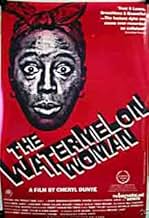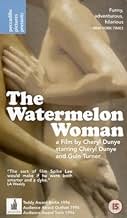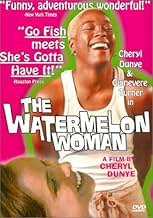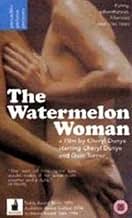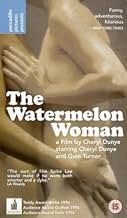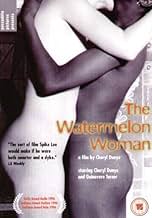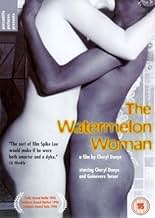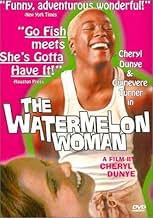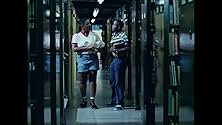IMDb RATING
7.1/10
4.5K
YOUR RATING
A young black lesbian filmmaker probes into the life of The Watermelon Woman, a 1930s black actress who played 'mammy' archetypes.A young black lesbian filmmaker probes into the life of The Watermelon Woman, a 1930s black actress who played 'mammy' archetypes.A young black lesbian filmmaker probes into the life of The Watermelon Woman, a 1930s black actress who played 'mammy' archetypes.
- Awards
- 4 wins total
Cheryl Clarke
- June Walker
- (as Cheryl Clark)
Kat L Robertson
- Yvette
- (as a different name)
Featured reviews
There are hundreds upon thousands of lesbian movies, and the majority are labelled "Adult". Name one lesbian movie about black women that isn't pornographic? Watching this one was something I could relate to. Finally, a movie touching on black history, interracial attraction, stereotypes, and the fictional day-in-the-life of an aspiring film-maker. More original than most, speaking as a black woman. Excuse the bad technology, and you've got a story about a woman researching her black history and getting laid in the process! Maybe she couldn't get the rights to do "The Aunt Jemima Story". You know, that black maid who's face stared back at you from the pancake box, having gone through a few make-overs through the years? There's even a scene where Cheryl holds up movie stills of black actresses playing the usual slave/maid who become unknowns in the process. Well, this is one important movie for me, and I hope more people appreciate this as they listen to Cheryl's closing monologue. Now this movie deserves a remake!
6/10
6/10
A cause for celebration, this 20th Anniversary DVD release. The Watermelon Woman was a revelation back in 1996 and it is -- shame on us -- perhaps even more to-the-point today.
Seated by myself at the Film Forum here in NYC, 1996, a gay non-Black guy, I was expecting a variation on the Melvin Van Peebles satire from the early seventies, The Watermelon Man. But a mere five minutes into The Watermelon Woman, I knew I was in the presence of something special, indeed. Here was a tsunami of vivid, fresh air.
Cheryl Dunye -- writer, director, star -- had created something utterly new. Here she was, placing a Black Lesbian at the center, unapologetic about her same-sex longing and needs, about her rich magnetic Blackness, her fierce yet tender femaleness. For me, used to seeing Lesbians or gay men like myself held up for mockery or derision or contempt, it was a revelation to see Lesbians portrayed as just part of the human tapestry, regular people making it through the day, paying bills, falling in and out of lust and love.
For that alone, The Watermelon Woman deserves high praise. But it is about so much more. For Ms. Dunye uses her Blackness to probe an America which has never come to terms with its deep racist history. Ms. Dunye confronts it with wit and candor. Her character is researching a beautiful Black actress from the 1930s, who never received a credit in her films. It's like she never existed, a mere celluloid presence, nothing more.
As she probes deeper into the actress's past, Ms. Dunye begins peeling away her own reality. As both a Lesbian and a Black woman, in an America which marginalizes Lesbians, Blacks, women. She is forced to question assumptions about what it means to be a Lesbian and both a woman and a woman of color.
And here is where The Watermelon Woman becomes as timely as it was back in 1996. For in confronting her own marginalization, Ms. Dunye makes crystal clear why today's Black Lives Matter is so important to today's America. Like any work of art -- and make no mistake, The Watermelon Woman is a work of art, indeed -- meanings change over time. And though Black Lives Matter hadn't yet become a rallying cry, its genesis is inherent in The Watermelon Woman.
Cheryl Dunye, you and The Watermelon Woman are a oner!
Seated by myself at the Film Forum here in NYC, 1996, a gay non-Black guy, I was expecting a variation on the Melvin Van Peebles satire from the early seventies, The Watermelon Man. But a mere five minutes into The Watermelon Woman, I knew I was in the presence of something special, indeed. Here was a tsunami of vivid, fresh air.
Cheryl Dunye -- writer, director, star -- had created something utterly new. Here she was, placing a Black Lesbian at the center, unapologetic about her same-sex longing and needs, about her rich magnetic Blackness, her fierce yet tender femaleness. For me, used to seeing Lesbians or gay men like myself held up for mockery or derision or contempt, it was a revelation to see Lesbians portrayed as just part of the human tapestry, regular people making it through the day, paying bills, falling in and out of lust and love.
For that alone, The Watermelon Woman deserves high praise. But it is about so much more. For Ms. Dunye uses her Blackness to probe an America which has never come to terms with its deep racist history. Ms. Dunye confronts it with wit and candor. Her character is researching a beautiful Black actress from the 1930s, who never received a credit in her films. It's like she never existed, a mere celluloid presence, nothing more.
As she probes deeper into the actress's past, Ms. Dunye begins peeling away her own reality. As both a Lesbian and a Black woman, in an America which marginalizes Lesbians, Blacks, women. She is forced to question assumptions about what it means to be a Lesbian and both a woman and a woman of color.
And here is where The Watermelon Woman becomes as timely as it was back in 1996. For in confronting her own marginalization, Ms. Dunye makes crystal clear why today's Black Lives Matter is so important to today's America. Like any work of art -- and make no mistake, The Watermelon Woman is a work of art, indeed -- meanings change over time. And though Black Lives Matter hadn't yet become a rallying cry, its genesis is inherent in The Watermelon Woman.
Cheryl Dunye, you and The Watermelon Woman are a oner!
I liked how The Watermelon Woman blends a fictional narrative with real historical questions. Cheryl Dunye's storytelling is both creative and personal, making for a film that feels intimate and reflective. The indie production value is noticeable, and it's not a movie that will wow you with visuals, but its heart and purpose shine through. A solid film that's definitely worth checking out if you're into indie or queer cinema. The film's style is a bit unconventional, and it's not always the smoothest ride, but it's an important piece of cinema that sheds light on stories we don't often hear. It may not be for everyone, but I found it thought-provoking and original.
This is a very lighthearted film about a black video store clerk (Cheryl Dunye) who wants to make a documentary about an early black actress, known only as The Watermelon Woman." The fact that both Cheryl (Dunye) and the actress are lesbians keeps her going. In fact, in life imitating art, Cheryl finds that The Watermelon Woman was having a lesbian relationship with a white director, and then, she begins a relationship with a white video store customer (Guinevere Turner - American Psycho, Itty Bitty Titty Committee).
The film explored black language, early black actresses, black lesbians, mammies, and watermelon. It even featured an interview with Camille Paglia discussing mammies and watermelon in the context of blacks and Italians, It's nice to see Italians spoken of in something other than the Mob.
Her BFF Tamera (Valarie Walker) is a party girl, but she draws the line at interracial relationships, and that causes a problem for Cheryl.
There are a lot of good scenes throughout the movie, and it made it worthwhile even if the acting wasn't particularly good.
The end credits will surprise you.
The film explored black language, early black actresses, black lesbians, mammies, and watermelon. It even featured an interview with Camille Paglia discussing mammies and watermelon in the context of blacks and Italians, It's nice to see Italians spoken of in something other than the Mob.
Her BFF Tamera (Valarie Walker) is a party girl, but she draws the line at interracial relationships, and that causes a problem for Cheryl.
There are a lot of good scenes throughout the movie, and it made it worthwhile even if the acting wasn't particularly good.
The end credits will surprise you.
Really great movie loved the documentary style seaming with the actual film fun characters great transitions inbetween shots and enjoyed how random some of the cuts or scene transitions are
Did you know
- TriviaAccording to writer/director Cheryl Dunye, much about the character she plays in the film is autobiographical, but the historical references to the Watermelon Woman are fictional: "The Watermelon Woman came from the real lack of any information about the lesbian and film history of African-American women. Since it wasn't happening, I invented it."
- GoofsCheryl (Cheryl Dunye) appears to make a slight fluff of her lines during a dinner scene with Diana, Tamara and Stacey, saying: "Anyway, Diana, if you came to Philadelphia to shape... escape the cold Chicago winters..."
However, as the dinner conversation is deliberately uncomfortable, this is possibly intended.
- Crazy creditsThe film, which seems to be a documentary about Cheryl's search for the obscure actress who inspired her, ends with these printed words: "Sometimes you have to create your own history. The Watermelon Woman is fiction. Cheryl Dunye, 1996"
- Alternate versionsIn 2016, director Cheryl Dunye's landmark Black Queer Film THE WATERMELON WOMAN was re-released in select theaters and festivals with a pristine 2K HD restoration overseen by the production company 13th Gen, in partnership with Modern Videofilm. The restoration and re-release was sponsored by First Run Features, the Outfest UCLA Legacy Project, and the Toronto International Film Festival. This theatrical tour will be followed by a DVD re-release in early 2017.
- ConnectionsFeatured in Fabulous! The Story of Queer Cinema (2006)
- How long is The Watermelon Woman?Powered by Alexa
Details
Box office
- Budget
- $300,000 (estimated)
- Gross US & Canada
- $1,989
- Opening weekend US & Canada
- $774
- Nov 13, 2016
- Gross worldwide
- $1,989
- Runtime1 hour 25 minutes
- Color
Contribute to this page
Suggest an edit or add missing content




